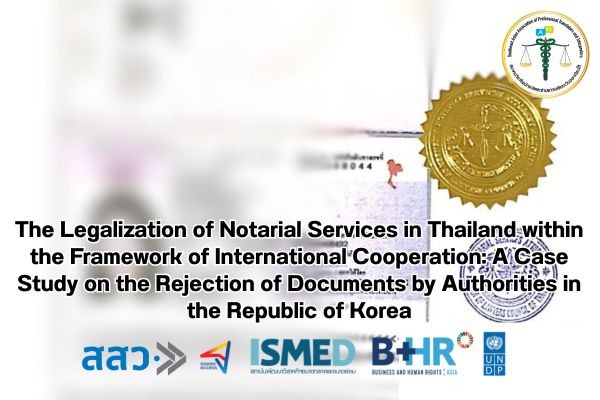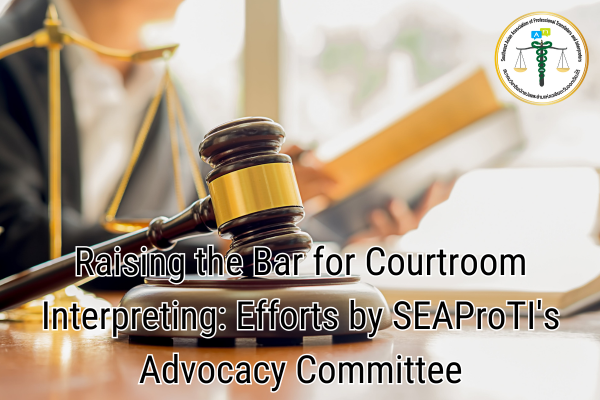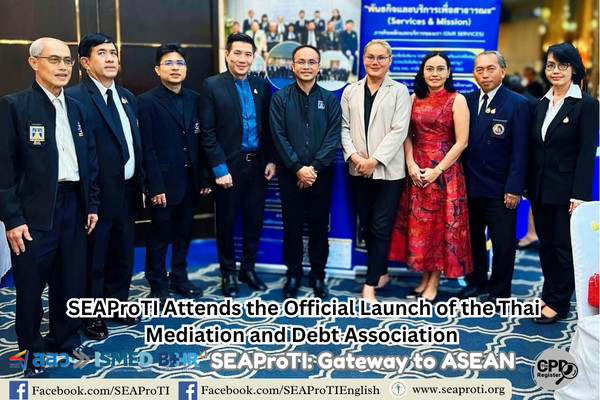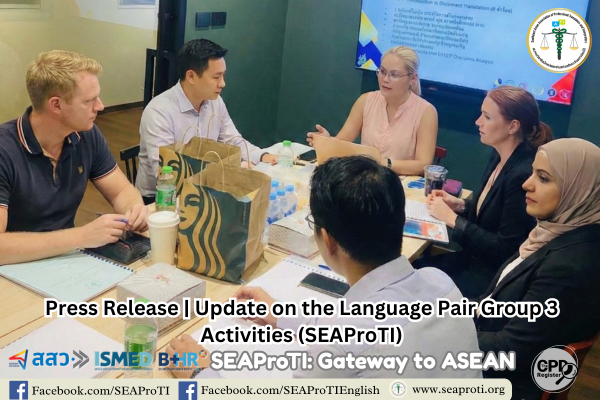The Legalization of Notarial Services in Thailand within the Framework of International Cooperation:
A Case Study on the Rejection of Documents by Authorities in the Republic of Korea
This article examines the issue of Thai documents, notarized by licensed Notarial Services Attorneys, being rejected by authorities in the Republic of Korea. The objective is to analyze the legal and procedural incompatibilities that arise in the cross-border authentication of documents, and to propose appropriate solutions both in practice and in policy. The findings reveal that inconsistencies between national and international legalization frameworks—particularly Thailand’s non-membership in the Hague Convention of 1961 on Apostille—are a key barrier to the recognition of otherwise legally valid documents abroad. The article argues for Thailand’s accession to the Hague Convention, alongside enhanced public awareness and procedural clarity, to improve the international usability of Thai documents.
In an increasingly globalized world, cross-border mobility, business operations, and academic exchanges have led to a growing demand for internationally accepted official documents. The process of document legalization has become essential in ensuring the authenticity and legitimacy of such documents across jurisdictions. In Thailand, notarization by licensed Notarial Services Attorneys is a legally recognized domestic practice. However, complications arise when such notarized documents are submitted abroad, particularly in countries that do not have bilateral agreements with Thailand regarding mutual recognition of notarization. This article highlights a specific case involving the Republic of Korea, which has refused to accept notarized documents from Thailand due to its non-recognition of Thai notarial certification under its legal framework.
Notarial Services in Thailand: Definition and Legal Status
In Thailand, Notarial Services are provided by licensed attorneys who have completed specialized training and received authorization from the Lawyers Council of Thailand. These services include certifying the authenticity of signatures, verifying true copies of documents, and attesting to the execution of legal instruments. While these certifications are valid under Thai law, they do not carry automatic legal weight internationally unless the documents are further legalized by the Department of Consular Affairs, Ministry of Foreign Affairs of Thailand. This legalization process verifies the identity and authority of the notary and is generally required before the documents can be accepted abroad.
Issues and Legal Limitations in International Contexts
Despite being properly notarized under Thai law, documents often face rejection when presented in foreign jurisdictions, particularly in Apostille Convention countries. The Republic of Korea, a member state of the Hague Convention of 1961, only accepts documents that have been legalized via an Apostille—a simplified form of legalization that Thailand does not yet provide due to its non-membership in the Convention.
In the case studied, Korean authorities rejected documents notarized by Thai Notarial Services Attorneys on the grounds that they were not recognized as official under Korean law, as they lacked an Apostille or embassy certification. This discrepancy reflects the structural misalignment between Thailand’s legalization framework and those of countries operating under the Apostille system, thereby complicating cross-border legal compliance for individuals and institutions.
To ensure acceptance of Thai documents in countries like Korea, the following steps should be taken:
- Have the document notarized by a certified Notarial Services Attorney in Thailand.
- Submit the document for legalization at the Department of Consular Affairs, Ministry of Foreign Affairs.
- If required, seek further authentication from the Embassy of the destination country in Thailand (e.g., the Embassy of the Republic of Korea).
- If already abroad, request authentication from the Thai Embassy or Consulate in the country of residence.
- These steps provide a more universally accepted form of legalization that aligns with international standards, especially in the absence of an Apostille mechanism in Thailand.
Policy Recommendations
To improve international recognition of Thai documents, this article proposes the following policy actions:
- Thailand should consider accession to the Hague Convention of 1961 to adopt the Apostille system, which would simplify the legalization process and enhance international trust.
- Develop and maintain an online database or portal that outlines country-specific legalization requirements to support the public, legal practitioners, and international institutions.
- Promote public awareness of the limitations of Notarial Services and the necessity of legalization for international use.
- Foster bilateral agreements or administrative arrangements between Thai and foreign diplomatic missions to establish mutually accepted authentication procedures.
Conclusion
Although notarization by Thai Notarial Services Attorneys is legally valid within Thailand, such documents may be deemed insufficient for international use unless further legalized by the appropriate Thai and foreign authorities. The current lack of alignment with international practices—particularly the Apostille system—places unnecessary burdens on document users. To address this gap, Thailand should pursue legal harmonization through international treaties, promote better procedural guidance for the public, and improve intergovernmental coordination. These steps would help ensure the smooth cross-border recognition of Thai documents, thus facilitating international cooperation and legal certainty.
Read more:
SEAProTI’s certified translators, translation certification providers, and certified interpreters:
The Southeast Asian Association of Professional Translators and Interpreters (SEAProTI) has officially announced the criteria and qualifications for individuals to register as “Certified Translators,” “Translation Certification Providers,” and “Certified Interpreters” under the association’s regulations. These guidelines are detailed in Sections 9 and 10 of the Royal Thai Government Gazette, issued by the Secretariat of the Cabinet under the Office of the Prime Minister of the Kingdom of Thailand, dated July 25, 2024, Volume 141, Part 66 Ng, Page 100.
To read the full publication, visit the Royal Thai Government Gazette
การรับรองเอกสารแบบ Notarial Services ของไทยในบริบทความร่วมมือระหว่างประเทศ:
กรณีศึกษาการปฏิเสธเอกสารโดยหน่วยงานปลายทางในสาธารณรัฐเกาหลี
บทความนี้มุ่งศึกษากรณีการปฏิเสธเอกสารที่รับรองโดยทนายความไทยซึ่งมีใบอนุญาตให้บริการ Notarial Services โดยหน่วยงานปลายทางในสาธารณรัฐเกาหลี เพื่อวิเคราะห์สาเหตุ ปัญหา และแนวทางแก้ไขตามหลักกฎหมายระหว่างประเทศว่าด้วยการรับรองเอกสาร (legalization) บทความเสนอว่า ความไม่สอดคล้องของระบบการรับรองเอกสารระหว่างประเทศอาจส่งผลให้เอกสารที่รับรองโดยทนายความไทย แม้ถูกต้องตามกฎหมายภายในประเทศ กลับไม่เป็นที่ยอมรับโดยต่างประเทศที่มีระบบการรับรองหรือข้อกำหนดเฉพาะ เช่น การรับรองแบบ Apostille หรือการรับรองจากสถานทูตโดยตรง ทั้งนี้ ข้อเสนอเชิงนโยบายของบทความ คือ การปรับปรุงแนวทางเผยแพร่ความรู้เกี่ยวกับข้อจำกัดของ Notarial Services รวมถึงการผลักดันให้ประเทศไทยเข้าร่วมอนุสัญญา Hague Convention 1961 เพื่อเพิ่มประสิทธิภาพการยอมรับเอกสารในระดับสากล
ในโลกยุคโลกาภิวัตน์ ความร่วมมือระหว่างประเทศด้านกฎหมาย การศึกษา การย้ายถิ่นฐาน และการประกอบธุรกิจระหว่างประเทศเพิ่มมากขึ้น เอกสารที่ออกโดยหน่วยงานภายในประเทศจึงจำเป็นต้องได้รับการรับรองเพื่อใช้งานในต่างประเทศ การรับรองโดยทนายความผู้ให้บริการ Notarial Services ถือเป็นแนวปฏิบัติที่ยอมรับในระบบกฎหมายของไทย อย่างไรก็ตาม กลับพบว่ามีหลายกรณีที่เอกสารซึ่งได้รับการรับรองโดย Notarial Services ถูกหน่วยงานปลายทางในต่างประเทศปฏิเสธ โดยเฉพาะในประเทศที่ไม่ได้มีข้อตกลงยอมรับการรับรองจากกันโดยตรง เช่น กรณีของประเทศสาธารณรัฐเกาหลี
ความหมายและสถานะของ Notarial Services ในประเทศไทย
Notarial Services ตามประกาศของสภาทนายความแห่งประเทศไทย หมายถึง การให้บริการรับรองเอกสาร หรือพยานเอกสาร โดยทนายความที่ผ่านการอบรมและได้รับอนุญาตเป็นผู้ให้บริการ Notarial Services Attorney อย่างไรก็ตาม การรับรองเอกสารดังกล่าวมีผลเฉพาะในทางกฎหมายภายในประเทศ เว้นแต่จะผ่านกระบวนการรับรองจากกรมการกงสุล กระทรวงการต่างประเทศ (legalization) จึงจะสามารถใช้งานในต่างประเทศได้
ปัญหาและข้อจำกัดในบริบทระหว่างประเทศ
กรณีศึกษาในบทความนี้ พบว่า หน่วยงานปลายทางในเกาหลีใต้ปฏิเสธการรับรองเอกสารที่รับรองโดย Notarial Services Attorney ของไทย โดยให้เหตุผลว่าเอกสารดังกล่าวไม่ได้รับการรับรองโดยหน่วยงานทางการหรือไม่มี Apostille ตามที่กฎหมายเกาหลีรองรับ ทั้งนี้ เกาหลีใต้เป็นภาคีในอนุสัญญา Hague Convention 1961 ว่าด้วยการยกเว้นการรับรองเอกสารราชการต่างประเทศ โดยยอมรับเฉพาะเอกสารที่ผ่านการรับรองแบบ Apostille ในขณะที่ประเทศไทยยังมิได้เข้าร่วมอนุสัญญาดังกล่าว ส่งผลให้เอกสารจากไทยจำเป็นต้องผ่านการ “legalization” โดยกระทรวงการต่างประเทศไทย และ/หรือการรับรองโดยสถานเอกอัครราชทูตของประเทศปลายทาง
แนวทางปฏิบัติในการแก้ไขปัญหา
เพื่อให้เอกสารจากประเทศไทยได้รับการยอมรับจากหน่วยงานปลายทางในต่างประเทศอย่างถูกต้อง ผู้ใช้บริการควรดำเนินการตามขั้นตอนดังนี้:
- ขอรับรองเอกสารจาก Notarial Services Attorney ที่ได้รับใบอนุญาตอย่างถูกต้อง
- ถัดมา นำเอกสารไป “legalize” ที่กรมการกงสุล กระทรวงการต่างประเทศ
- ขอให้สถานเอกอัครราชทูตของประเทศปลายทาง (เช่น สถานทูตเกาหลีประจำประเทศไทย) รับรองซ้ำอีกครั้ง หากจำเป็น
- หากอยู่ในประเทศปลายทาง ให้ติดต่อสถานเอกอัครราชทูตไทยเพื่อขอรับรองเอกสารในต่างประเทศ
ข้อเสนอเชิงนโยบาย
เพื่อลดอุปสรรคด้านเอกสารและส่งเสริมความร่วมมือระหว่างประเทศ รัฐบาลไทยควร:
- พิจารณาเข้าร่วมเป็นภาคีอนุสัญญา Hague Convention 1961 ว่าด้วย Apostille
- จัดทำฐานข้อมูลออนไลน์เกี่ยวกับขั้นตอนการรับรองเอกสารสำหรับประเทศคู่ค้าแต่ละประเทศ
- เสริมสร้างความรู้ให้แก่ทนายความ ผู้แปล และประชาชนทั่วไปเกี่ยวกับข้อจำกัดของการรับรองแบบ Notarial Services
สรุป
แม้การรับรองโดย Notarial Services Attorney ของไทยจะมีผลในระดับกฎหมายภายในประเทศ แต่ในบริบทระหว่างประเทศ เอกสารดังกล่าวอาจไม่ได้รับการยอมรับ หากไม่ผ่านการรับรองโดยหน่วยงานที่มีอำนาจตามที่ประเทศปลายทางกำหนด บทความนี้เสนอว่า การเพิ่มความเข้าใจในกลไกกฎหมายระหว่างประเทศ และการเตรียมเอกสารอย่างครบถ้วนตามขั้นตอน จะช่วยลดข้อพิพาท และอำนวยความสะดวกในการติดต่อข้ามพรมแดนได้อย่างมีประสิทธิภาพ
อ่านเพิ่มเติม:
เกี่ยวกับนักแปลรับรอง ผู้รับรองการแปล และล่ามรับรองของสมาคมวิชาชีพนักแปลและล่ามแห่งเอเชียตะวันออกเฉียงใต้
สมาคมวิชาชีพนักแปลและล่ามแห่งเอเชียตะวันออกเฉียงใต้ (SEAProTI) ได้ประกาศหลักเกณฑ์และคุณสมบัติผู้ที่ขึ้นทะเบียนเป็น “นักแปลรับรอง (Certified Translators) และผู้รับรองการแปล (Translation Certification Providers) และล่ามรับรอง (Certified Interpreters)” ของสมาคม หมวดที่ 9 และหมวดที่ 10 ในราชกิจจานุเบกษา ของสำนักเลขาธิการคณะรัฐมนตรี ในสำนักนายกรัฐมนตรี แห่งราชอาณาจักรไทย ลงวันที่ 25 ก.ค. 2567 เล่มที่ 141 ตอนที่ 66 ง หน้า 100 อ่านฉบับเต็มได้ที่: นักแปลรับรอง ผู้รับรองการแปล และล่ามรับรอง

























